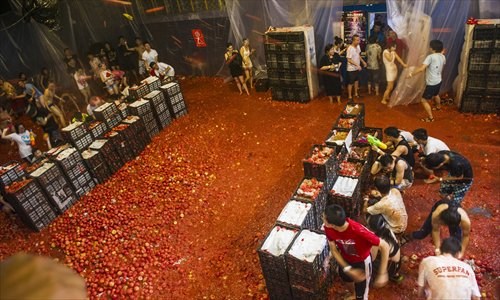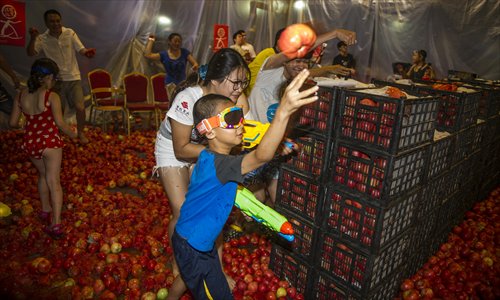

Hundreds of people became soaked in juice from 10 tons of tomatoes during Splash Wars at Mako Livehouse in Shuangjing, Chaoyang district, on July 6. For 100 yuan ($16), people were invited to pelt each other with tomatoes purchased from a local wholesale market. Despite some concerns about food waste, event organizers assured the public only tomatoes unsuitable for human consumption were used. The overall response from participants was positive, but some complained about the lack of shower facilities and firmness of tomatoes. Photos: Li Hao/GT

Waste woes dismissed
Jerry Guo, one of the organizers of Splash Wars, told Metropolitan the event was about "giving people a chance to have fun" and release stress from their daily lives. "People in Beijing are under a lot of pressure, but I believe everybody has an inner child," he said.
The most difficult task for organizers was finding an appropriate location to host the event. On the eve of the battle, Guo and his team were up all night waterproofing Mako Livehouse's main arena using a giant reel of cling wrap.
One of the main criticisms of food fights is the massive waste of food, but Guo said tomatoes used in Splash Wars were rejects bought from Xinfadi Wholesale Market, Fengtai district. The tomatoes were either too soft or rotten, Guo said, making them unfit for sale at the market.
Even the leftover tomatoes from the battle weren't destined for the trash, said Guo. "The remains will be sent to a local pig farm," he said.
Guo, a 26-year-old Chinese-American, said he and his team prepared for Splash Wars by learning from the success of La Tomatina. But there were some noticeable cultural differences between the events, he noted.
"Chinese participants called us to ask what they should wear, and many foreigners challenged us by asking about where the tomatoes were from and whether they would be wasted. Food waste is an issue foreigners tend to care about," he said. "In future, we'll try to make a food-based charity event out of this."
For his part, Zhao said food waste wasn't a key concern on the minds of revelers during their battle. "I don't think this is a waste of food. After all, research needs to be done before people can jump to the conclusion that these tomatoes could solve hunger problems in some poor regions," he said.
Despite being a fun-filled day, Zhao identified some problems that should be tackled by organizers for future events. "The firmness of the tomatoes is a problem. Not all of them could be easily squashed. The first few hits hurt a lot; it was just like being hit by paintball," he said.
Another problem was the lack of showers and pools, which no doubt annoyed subway staff at Shuangjing invaded by a "red army" after the battle. Zhao would also like to see a more innovative battlefield that provided combatants with cover.
"An open arena would be more strategic and provide a lot of places to hide," said Zhao. "It is like going back to the primitive age of plain warfare, but it is still fun!"
Copyright ©1999-2018
Chinanews.com. All rights reserved.
Reproduction in whole or in part without permission is prohibited.